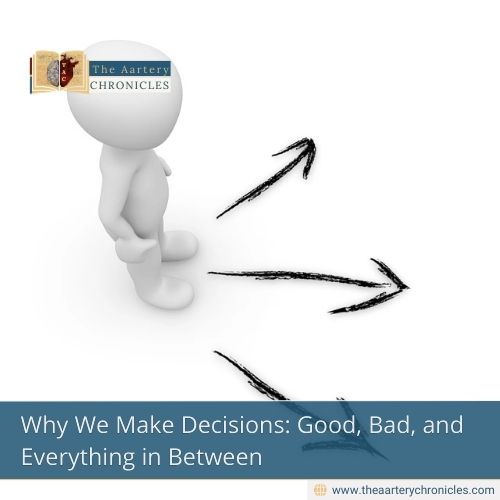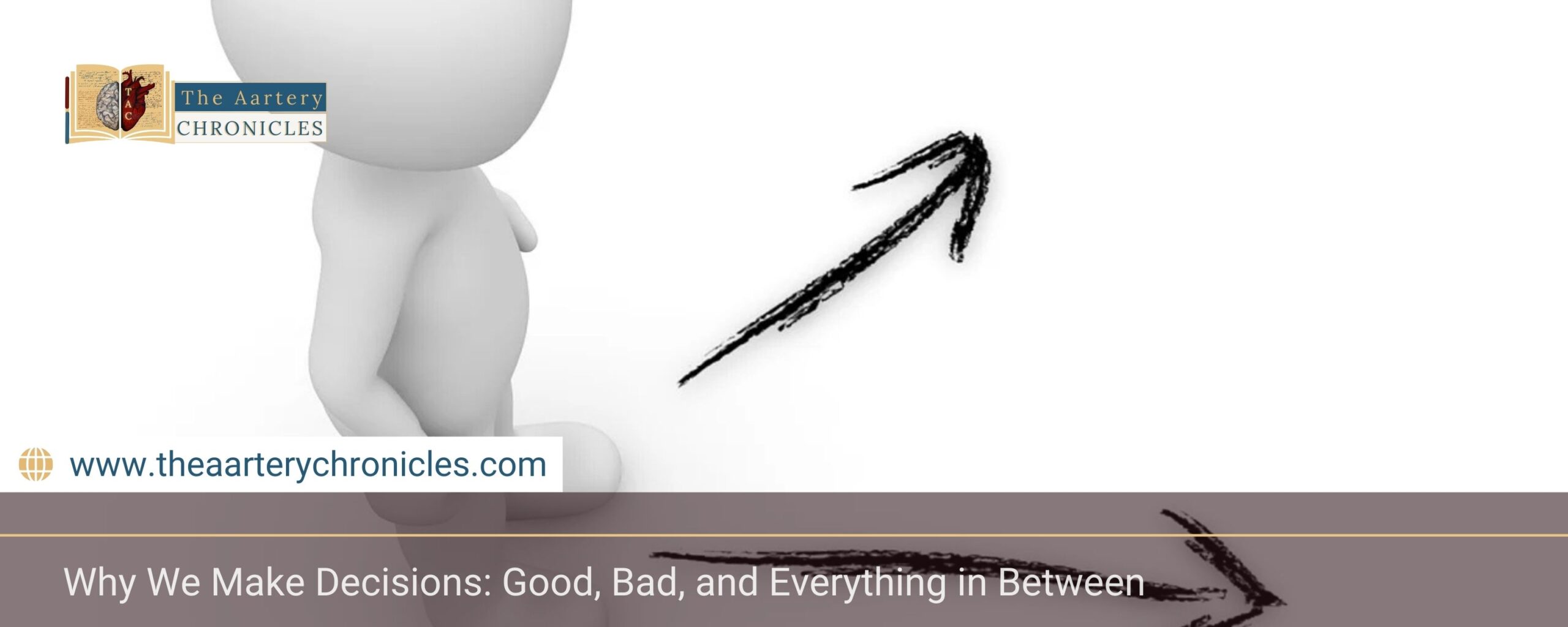

Why We Make Decisions: Good, Bad, and Everything in Between
Life is full of decisions that we have to make, be it good ones or bad ones. It can be basic decisions like what colour clothes should I wear for the cocktail dinner ? what type of gift should I buy for my parents’ anniversary ? what should I eat – shall I cook at home or order take-out?
Making decisions is a part of life and based on our morals, values, belief, and action. It is the impulsively taken emotional decisions that can, at times, prove to be ‘bad’ decisions. E.g. you tore up your leave application because the senior made some disparaging comment; you threw your mobile because your ex was calling; you blocked your bestie because she was told you how gullible you are; you stopped dancing because your parents did not approve of it as a career;
We are emotional and we tend to take decisions in the throes of emotions.
What is the prelude to a decision
Before making a decision, we need to think rationally and weigh the pro-s and con-s of the situation. How is this decision gong to affect us ? What will we have to forego as a consequence ? What can be the future repercussions of this decision ? What if this decision is a mistake ? What will people say ?
How to take decisions
Decisions affect different people in different ways. A few things to keep in mind are:
1. Self-awareness:
Recognise the emotions that you are going through and be aware of them. If you are feeling angry, do not make any hasty decisions, as you may regret them in the future. Instead, calm yourself down and then decide.
If you are so in love, do not make any hasty decisions without contemplating the long-term effects, as you may end up broken-hearted. Instead, try to be practical and then decide, after all, love is not going to pay those bills!
Identifying your feelings in that given situation, and then deciding, after examining both the pros and cons, is what should be done. Do not let your feelings rule your decisions all the time. But, of course, some emotional decisions have to be made at some point in life.
2. Clear thinking:
Penning down your thoughts or discussing the issue with a loved one gives a clear perspective and eases the decision-making. Psychologists recommend journaling – you write your thoughts at a given time and revisit them later. This gives you a clearer picture of how things were when you wrote them and how they are now, thereby giving you the chance to make the correct decision.
3. Time:
Some decisions need to be made at a certain point in time. If you put off these decisions, you may face some missed opportunities that will not come again. E.g. there is a deadline for you to submit your project in college. You miss it and are denied an extension for submission, according to the rules and regulations of the contest. This makes you unhappy and angry with yourself for not being serious enough. You took the whole thing lightly, thinking you would manage to complete it, but the electricity outage for three consecutive days made it impossible for you to adhere to the deadline. So, you missed an opportunity for getting a chance to be recruited by a top-notch firm.
4. Underestimating:
Sometimes we underestimate the long-term benefits. Picture this: You have been advised to take a daily walk for 30 minutes by your doctor. Initially, you are very regular, but sometimes you skip a couple of days in between, thinking, “What harm if I miss a couple of days?” This attitude ups your “skip days” and at the end of the year, you realise that you walked for only 175 days in the year! This led to your inability to manage your weight, and now you have been advised a strict diet, medication, and rigorous exercise regimen. What could easily be achieved with a simple walk has now led to such consequences. It is this “just a couple of days” that we tend to underestimate the outcome in the long run. Every penny counts; likewise, every step counts, however small it may be.
5. Influence:
We are often influenced by social status, and we tend to make bad decisions. Picture this: a celebrity is endorsing an online game which is all over social media. You think, “ok, if they are endorsing this game, it must be good and safe”. So, you download that game, but end up losing a substantial sum of money playing it. Ask yourself, was this decision worth it? What was I thinking? I have lost so much hard-earned money. Why was I blinded by the status and glamour of the celebrity that I never stopped to consider the dire consequences? What shall I do? Obviously, the celebrity is not responsible for your loss. It was your decision, taken in the sway of emotion and influence that led to this. Always think twice before deciding, rather than blindly getting influenced by social status.
6. Understand yourself:
Learn to understand your weaknesses and strengths. Do not get swayed by impulse. You need to understand yourself better to help with your decisions. Picture this: You know that you find it difficult to ‘say no’. A colleague requests you to make a report as he has an urgent family matter that requires his attention. You agree but end up regretting it, as you have been suddenly given a top-priority task by your superior, with a deadline. Now you are flummoxed, should you do your colleague’s report first or your task? There is no way that magic will happen, and you will sprout another set of hands and another head, so you can do both! Say no, decline your colleague and avoid taking a bad decision. No doubt, you may feel you let down your colleague, but that’s all right. Maybe you can help him some other time.
7. Will Power:
Decisions require will-power and discipline too. Picture this : you are spending too much time watching Netflix and are depriving yourself of meeting and chilling with your friends. You think “oh, this series is so exciting, I can’t think of going out until I finish watching it.” What is the solution ? Remove your Netflix subscription temporarily – simple: no Netflix – no binge watching. No Netflix = your going out to chill with your friends. It is, this, will power and discipline that help you make good decisions. Once you learn to manage your screen time and friend time, you can renew your Netflix subscription. How cool is that !
8. Responsibility:
We are humans and we have to make choices and decisions that affect our life. There is no avoiding that. We should be responsible for all the decisions – whether good or bad- that we make. We cannot blame the weather or the traffic or the vehicle if we reach office late. Own it, it is your life, your decision. Be responsible for your actions and decisions.
Given that making decisions is never easy but it is not impossible either. Practising Mindfulness i.e. being present and aware in the moment, is a good way to take decisions. Other techniques like deep breathing, Yoga, physical exercise, journaling, music therapy, art therapy, dance therapy, meditation – all help to ease our tension and manage our emotions, and are helpful in taking the correct decision.
Bad decisions that do not harm us or others, can teach us and become a learning point in our lives. They teach us about what mistakes need to be avoided, so as not to repeat them. Of course, there is no way you can only make good decisions in your life. There are going to be circumstances that entail making bad decisions, as it all a part of life. Live your life to the fullest, own your decisions and decide for yourself.









